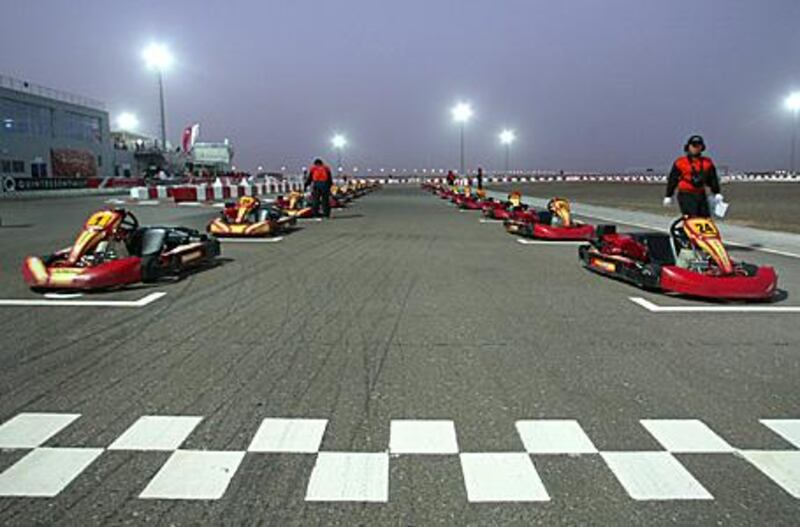Abu Dhabi will once again host the season's last Grand Prix. But away from the glamorous racing circus, what is being done to develop motorsport in the country? The United Arab Emirates was still in the process of being formed when, in 1971, a 19-year-old Nelson Piquet drove to victory at Brazil's national karting championship. In those days none of the emirates had any link with motorsport and rulers were more concerned with the dramatic shift in the political landscape.
Thirty-eight years later and much has changed: Piquet is a retired three-time Formula One world champion and Abu Dhabi last month hosted its inaugural Formula One Grand Prix. Yet while drivers have been replaced, cars have evolved, rules have been altered and circuits swapped, the first step to F1 success remains the same. Piquet, Nico Rosberg, Ayrton Senna, Nigel Mansell, Alain Prost, Mika Hakkinen, Michael Schumacher, Fernando Alonso, Lewis Hamilton, Robert Kubica and Jenson Button all earned their racing stripes in karting.
The UAE is recognising that beyond the glitz and glamour of an annual Grand Prix there is a need to nurture native talent from an early age and facilities have been built to help make this happen. The Dubai Autodrome, which opened in October 2004, has its own 1.2km international karting circuit; the Al Ain Raceway, a karting facility on the UAE side of the Emirates-Oman border, has a track and the Yas Marina Circuit intends to open its international-standard Kartdrome next year.
With the facilities in place, it is a matter of attracting interest. "Everybody who wants to race wants to drive Formula One," says Guy Sheffield, managing director of the Al Ain Raceway. "But what we are really lacking in the UAE, and it's something we are striving to change, is the realisation from everybody that to get to the better cars, you've got to really start in a kart. "You've got to get involved from an early age: eight, nine, 10.
"If you speak to any F1 driver, the majority of them honed their skills in karts. You see Schumacher and Massa, when they are trying to get back up to fitness, the first thing they do is get in a kart and do a few laps." Sheffield, who was in Sharm El Sheikh at the final of karting's Rotax Max Challenge last week, reveals the Raceway, which opened in May 2008, has no registered Emirati drivers under the age of 16.
Likewise, while the Dubai Autodrome has more than 60 registered karters on its books none of them are UAE citizens. Paul Velasco, the communications manager at the Autodrome, says that as essential as karting is in the Emirates' quest to produce a driver who can compete on the world stage, there are a number of obstacles that must be overcome, most notably a lack of parental commitment. Last year, the Autodrome covered all the costs for young drivers to compete in a year-long competitive season - a fee estimated at around Dh28,000. This year, in a bid to strengthen family ties and heighten parental dedication, a "certain financial commitment" will be required.
"It's not about the money, it's about getting the parents to make a commitment: to get involved," says Velasco. "Anywhere else in the world there is this relationship between father and son, but here that's lacking. "Last year some parents were coming along and dropping their kids off and then leaving - it was like they were taking them to school. "Parents must remember they've got to get their hands slightly dirty if their child is to build a career in motor racing."
Sheffield agrees, but is quick to add that it is not just the parents who need to show dedication, the drivers must do so too. "We've had guys come along for one or two races and then they miss a race and say 'oh I was travelling', or 'oh, I was with my horses'. They need to realise that if they want to get to the top level, they have to commit to the series," he says. "I'm from the UK and over there you have huge grids because it is just so popular, yet compared to here the facilities on offer are really minuscule.
"What we have here is world class and that helps us because what we are trying to do is develop the sport in the UAE in terms of professionalism so, ultimately, we can eventually compete with the rest of the world on the track." Both the Raceway and Autodrome have noticed the effects of the first Abu Dhabi Grand Prix. From increased interest from fans to increased investment from UAE-based companies, motorsport is growing in the region.
Both racing facilities are keen to continue building on the foundations laid by Formula One. "With Yas opening, it's brought awareness in terms of motorsport, but what people really need to realise is that it's a long-term plan," says Sheffield. "You speak to the guys who are running the country and what they really want is a local driver to represent the UAE on a worldwide scale, but they know it's not going to happen in three of four years, we're talking eight, nine, 10 years from now."
Velasco agrees: "It's not going to happen overnight. The conditions are there though - the facilities available can provide a world-class grounding to do well internationally, whether it's here at the Autodrome, in Al Ain or at Yas Marina. "But the most important thing to remember is that to get into Formula One you have to start on the bottom rung of the ladder - and that is karting." gmeenaghan@thenational.ae





